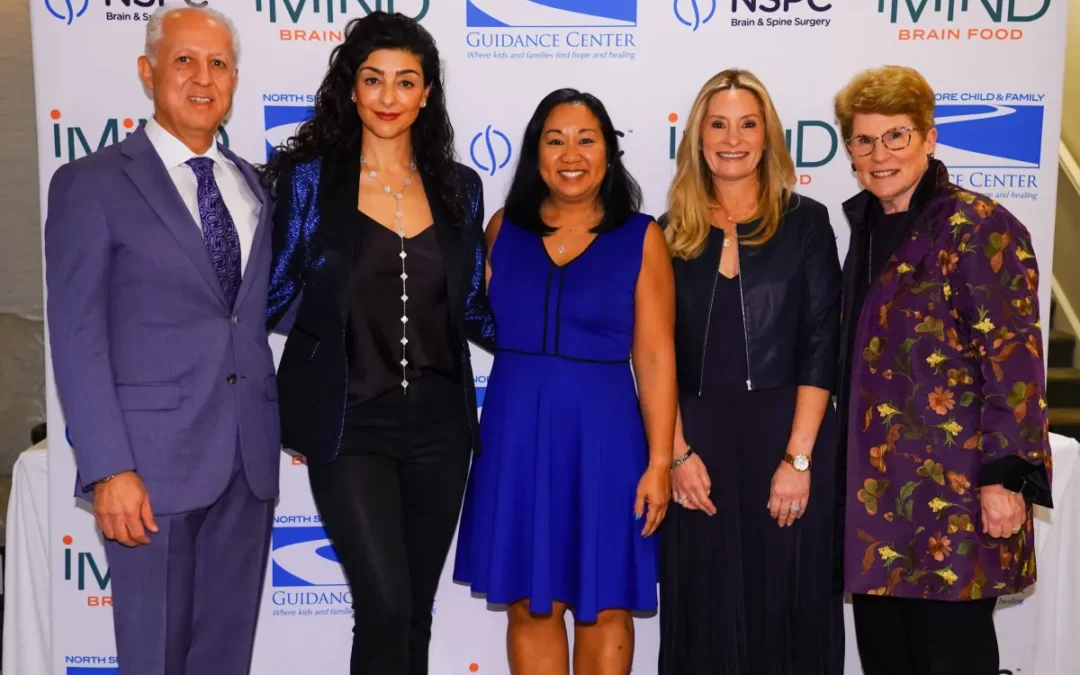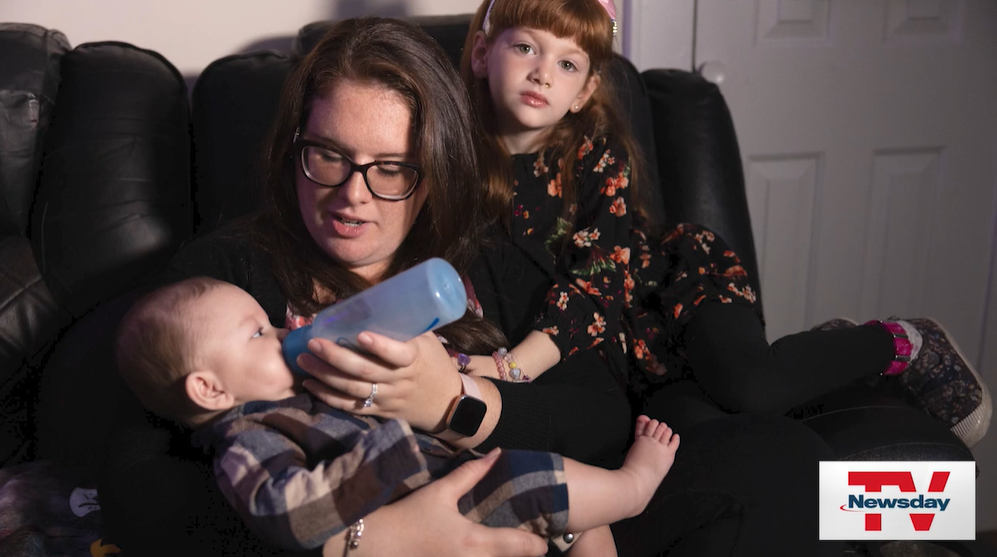by North Shore Child & Family Guidance Center | Dec 20, 2014 | Press Releases
The Dammann Fund, Inc. has awarded North Shore Child and Family Guidance Center with a grant of $10,000 to support its Good Beginnings for Babies (GBB) program, a service that operates out of the Guidance Center’s Leeds Place in Westbury and offers support for pregnant and parenting teens.
According to Guidance Center CEO Andrew Malekoff, “GBB promotes the healthy development of children by ensuring access to prenatal care and promoting preventive care for parents and their children. We aim to help the moms reach full-term pregnancies, deliver healthy birth weight babies and build strong attachments with their newborns. Good attachments are the cornerstone of healthy emotional development.”
GBB Program Director, Dr. Nellie Taylor-Walthrust added, “In GBB we work with families to develop and promote a community of support. The goal is to reduce isolation of young parents in the early years of their child’s development and increase the community’s sense of responsibility for young families, by building a community of young parents who support one other.” Dr. Taylor-Walthrust added, “We also carefully screen for maternal depression and other perinatal mood disorders and provide treatment or referrals for mental health care, as indicated.”
North Shore Child & Family Guidance Center is the pre-eminent children’s mental health agency on Long Island. The Guidance Center is dedicated to strengthening the emotional well-being of children and families, and leads the way in diagnosis, treatment, prevention, training, parent education, and advocacy.
The Guidance Center helps families to raise healthy children and works with kids (ages 0-24) who are troubled, in trouble, or causing trouble and parents who need help in these stressful times. Difficulties range from depression and anxiety, developmental delays and school failure, from substance abuse to family crises stemming from illness, death, trauma, and divorce. We offer outpatient mental health counseling and teen drug abuse and prevention services.
Our highly-qualified multi-cultural and bi-lingual staff consists of teams of caring psychiatrists, psychologists, social workers, drug & alcohol counselors, mental health counselors, and family advocates, with expertise in working with children.
To learn more about the Guidance Center, visit our website: www.northshorechildguidance.org or call 516 626 1971.

by North Shore Child & Family Guidance Center | Feb 12, 2025 | In The Media, Long Island Press
Published on November 19, 2024, Long Island Press, Long Island Business News
North Shore Child & Family Guidance Center’s Hope and Healing Gala was a night to remember, celebrating the transformative work of the Long Island’s premiere nonprofit children’s mental health organization. Held on November 13, 2024 at North Hempstead Country Club, the event brought together community leaders, supporters, and friends to raise nearly a quarter million dollars in support of vital programs and services.
“When you’ve been around for as long as we have, you know that the only way to keep going is by moving forward,” said Alexis Siegel, President of the Board of Directors. “By listening and responding to the changing needs of the community, we have kept a finger on the pulse of what is most needed by the children and families on Long Island.”
The evening honored Dr. Ramin Rak, neurosurgeon at NSPC Brain and Spine Surgery and Founder/CEO of iMind Brain Food. Dr. Rak consistently amplifies the connection between the health of the mind and body and is a valued supporter of the Guidance Center.
“The strides we are making in medicine are extraordinary, constantly pushing the boundaries of what is possible and giving patients hope where there was once none,” noted Dr. Rak. “But for all the progress we make in the operating room, it is organizations like the Guidance Center that create the environments where healing and transformation can continue beyond the operating room walls.”
Justine Hofsiss, a client of the Diane Goldberg Maternal Health & Wellness Program, shared a moving account of her journey with postpartum depression and anxiety. “I’m not exaggerating when I say that the Guidance Center saved my life,” she said, joined at the podium with the support of her husband. “They helped me see a future that I couldn’t imagine for myself in my darkest days. My children have a happy and healthy mom, and I can be there for my family just like they were there for me. I’m grateful beyond words to this incredible organization that gave me back hope and joy in my life.”
The evening’s music was provided by Peat Moss and the Fertilizers, who got guests out of their seats and onto the dancefloor. Holly Marcell, the 10th grade daughter of Board Members Andrew and Carol Marcell, captivated the audience with a touching performance of “She Used to Be Mine” from the musical Waitress, a song that emphasizes the importance of self-love.
Kathy Rivera, the Guidance Center’s Executive Director/CEO, thanked the evening’s Emcee, Stacey Sager of Channel 7 Eyewitness News, and the sponsors and underwriters of the event: Maureen & John Ferrari; Klipper Family Foundation; The Schott Foundation; WABC-TV; Marilyn & Russell Albanese; Americana Manhasset; SompoRe; Mary Margiotta & Vasu Krishnamurthy; Susan Isaacs & Elkan Abramowitz; and Lauren & Jonathan Schiff.

by North Shore Child & Family Guidance Center | Dec 3, 2023 | In The Media, Newsday
By Tiffany Cusaac-Smith, Published in Newsday, October 21, 2023
After giving birth to her son in March, Justine Hofsiss lay in the fetal position on a couch at her Franklin Square home unable to function.
Ringing in her ears, heart palpitations, sweating, shaking — those were among the symptoms she shared with her best friend, a nurse, who tried to provide remedies until realizing the salve might be mental health treatment.
“It was a very scary, very overwhelming time in my life, where I felt like I had no control of my body whatsoever,” said the mother of two who had already eschewed driving because of her emotions.
With a referral from the friend, Hofsiss in April turned to the North Shore Child & Family Guidance Center, crying in an intake call but finally hearing a voice to help make sense of her feelings after a traumatic birth and pregnancy.
“I hung up the phone and just cried because I’m like, ‘OK, this isn’t going to be forever. I’m going to be OK. I’m gonna get help,’” she said.
The North Shore Child & Family Guidance Center’s maternal health and wellness program is among a handful of places on Long Island working to treat pregnant people and those who have recently given birth for mental health issues such as anxiety or perinatal depression, which is common but can impact a woman’s ability to function — and even be life-threatening.
Roughly one in eight women in the United States said they experienced symptoms of postpartum depression since the birth of their babies, according to the Centers for Disease Control and Prevention.
Mental health conditions are the leading cause of pregnancy-related deaths, the CDC said, citing data from 2017 to 2019. That figure includes suicides and overdoses related to substance use.
In New York, mental health issues made up 15% of pregnancy-related deaths in 2018, or the third-leading cause, the state Department of Health said.
The overall number of women in the state who asked for help for depression after giving birth has steadily increased from 2017 to 2020, moving from 7.7% to 11.3%, the Department of Health said.
Meanwhile, the number of women who said a health care provider had asked them about depression symptoms at a postpartum visit moved from 76.1% in 2016 to 82.4% in 2020, the DOH said.
Childbearing is often perceived as a joyous moment, but it is also a moment of immense physical and emotional change that can leave people in anguish, experts say.
“The expectation is this should be such a wonderful point in your life,” said Dr. Sue Cohen, clinical psychologist and a clinical director at the center.
She later added: “Everyone, maybe their parents say to them, ‘Oh, you should feel so grateful you have a healthy child,’ but they’re not feeling it.”
Barriers to getting mental health care
And while in the throes of mental health ailments, many women also face barriers to getting care, including the stigma of such illness and long waits to see providers, said Dr. Brittain Mahaffey, a licensed clinical psychologist and director of the Dialectical Behavior Therapy at Stony Brook Medicine.
In addition, some psychiatrists will not prescribe medication to people who are pregnant or breastfeeding out of fear of harming the child. Other times, women will forgo their prescriptions while pregnant.
The North Shore Child & Family Guidance Center maternal program seeks to be a bridge for women seeking care, taking referrals from OB/GYNs, pediatricians and word-of-mouth.
They then do a screening call to ensure the women don’t need to be taken to a hospital. Within a week of that call, the parent is seen.
“We treat it like an emergency because these moms are at risk, and the babies could be at risk,” said Cohen, later noting: “We need to make sure everyone’s safe.”
Cohen said many of the program’s clients have had a traumatic birthing experience. A depressive or anxious history is sometimes the case.
The patients go into individual therapy or with a partner. A staff psychiatrist works to provide care for women who are pregnant or have just given birth. Parents can bring their children if they come in for visits, as evidenced by the toys and children’s artwork in the offices.
The sessions usually take place over a year but can last longer.
“Some women just need a little support to get through this period and you know, are grateful that they’ve gotten this, and they can go back to their level of functioning,” Cohen said.
Anxiety after difficult delivery
While pregnant with her son, Hofsiss was hospitalized multiple times because her blood pressure spiked. During delivery, the baby’s heart rate dipped, and she was given oxygen.
After the birth, she stayed in the hospital for a week — away from her daughter, 5, and unable to adjust to everyday life.
“I had a full-blown anxiety attack because I was afraid that my blood pressure was not going to get better. It was constantly going to be high. I was never going to go home. We have this new baby now, we need to get adjusted. And my anxiety just got bigger and bigger.”
She reached out to the North Shore Child & Family Guidance Center, where she was diagnosed with postpartum depression and anxiety.
There, she met a therapist who gave her strategies to promote her care and mindfulness. One of the tools that she holds close is the idea of kintsugi. The Japanese technique mends broken pieces of pottery but still shows the seams, demonstrating both beauty, imperfections and endurance.
“It’s a different version of what you were, but it’s going to be a better version. And it’s OK that it’s different than what you were used to,” said Hofsiss, who is also on medication.
Mahaffey said the stress that mothers experience before they become a parent is one of the most important predictors of depression and anxiety.
Young parents may have more stress because of financial difficulties and mothers who have had a traumatic pregnancy could be also more prone to anxiety.
“I want people to know that mental health problems don’t just magically start in the postpartum; it usually starts during pregnancy and then worsens into the postpartum,” she said.
Depression deepens during pregnancy
After struggling to get pregnant, Dhipinder Walia said she felt “embarrassed” when depression crept back up while she was pregnant.
“I always just sort of felt like something was wrong with me because it is something I was asking for. So why, why couldn’t I just figure it out?”
Walia, 35, of Lynbrook, eventually told her OB/GYN that she was depressed, only for her to be given providers who had a long waiting list.
Meanwhile, she said, her feelings of depression were stronger and deeper than when she was a teen and in her 20s.
“Whereas before I just felt like I was unable to, like, find joy in things and like, I just needed help and getting there,” she said. But this time, “it was like, physical and mental pain.”
She got mental health care only after her child was born, after she mentioned her feelings to the child’s pediatrician, who called a social worker and put her in contact with the program.
Once in therapy, Walia said she learned how not to lean into distorted thoughts or how to set herself up for a good cry when she was feeling weepy.
By 18 months into therapy, she had better structures in place, aiding her overall health and giving her a clearer sense of her purpose.
“My purpose is to, you know, be a good mom and to support folks who need support,” she said. “But, I also feel like I’ve gained a lot of confidence and … understanding — all these abilities that I didn’t ever think I could have.”

by North Shore Child & Family Guidance Center | Jul 23, 2020 | Blog
In the age of COVID-19, seeing a health care provider in the traditional office setting has become a potentially dangerous matter. Many health care providers, including doctors, mental health professionals and others, have closed their physical sites for their clients’ safety.
But a viable, necessary alternative has emerged in the form of telehealth, which refers to the use of communication technology such as cell phones or laptops to access health care services remotely.
North Shore Child & Family Guidance Center seamlessly pivoted to telehealth after our offices were closed in mid-March, and we’ve been seeing clients for individual, family and group therapy since that time. We’ve found some unexpected benefits of telehealth, including the ability to bring together family members who may have lived apart; getting insight into a client’s home life; and seeing clients who, because of illness, lack of transportation or other issues, cannot come into the office.
In addition, many individuals in need of mental health services may hesitate to get help, or even avoid it altogether. This can be for a variety of reasons, including (but not limited to) an inability to afford the services or the pervasive stigma surrounding mental illness.
Unfortunately, a delay in receiving these services can have devastating effects. Without help, the situation often escalates, and it can even grow into a matter of life and death. As Andrew Malekoff, executive director of the Guidance Center, explains, “Access delayed is access denied.”
Malekoff highlighted the value of telehealth in a recent Long Island Weekly article, where he emphasized recommendations for New York State to permanently remove barriers to telehealth services after the COVID-19 pandemic has subsided. He noted the experience of Vanessa McMullan, a clinical social worker at the Guidance Center, who discussed her recent experiences with clients and the benefits of telehealth in a variety of circumstances.
In one example, McMullan noted that many new mothers may delay mental health treatment out of fear that they may expose their vulnerable babies to illness or due to a lack of supervision for children at home. Given the pervasive nature of postpartum depression and other maternal mental health issues, this resistance can be highly detrimental to the mothers and their families. As McMullan explains, “These women are typically those who need services the most.”
With family therapy in particular, therapy sessions via video calls allow therapists to have a new sense of connection and intimacy with their clients. Therapists are able to see into the client’s home life and are able to understand more of their context than when in a removed office setting. The ease of online visits also enables the inclusion of family members who may be difficult to include in a traditional therapy setting, such as separated parents living in different areas.
Increasing access to telehealth services could also allow young adults attending college away from home to maintain a relationship with their local therapist, thus preserving the work that has been done.
While telehealth tools are not a perfect replacement for face-to-face sessions, they are undoubtedly a necessary service that enables accessibility of mental health care, and they should remain an option for the future. Accessibility of these services is more vital than ever, with rates of anxiety and depression rising rapidly amidst the uncertainty of the COVID-19 pandemic. Now is the time to utilize all tools at our disposal to ensure that clients who need care can receive it in a timely manner.
At North Shore Child & Family Guidance Center, accessibility to mental health services for all is a central mission of ours. For more information, we invite you to learn more about Project Access, an initiative designed to identify obstacles to accessing necessary care and finding solutions for change.
Sources:



